Elinor Ostrom
Elinor Ostrom
An Intellectual Biography
Vlad Tarko

Published by Rowman & Littlefield International Ltd
Unit A, Whitacre Mews, 26-34 Stannary Street, London SE11 4AB
www.rowmaninternational.com
Rowman & Littlefield International Ltd. is an affiliate of Rowman & Littlefield
4501 Forbes Boulevard, Suite 200, Lanham, Maryland 20706, USA
With additional offices in Boulder, New York, Toronto (Canada), and Plymouth (UK)
www.rowman.com
Copyright 2017 by Vlad Tarko
All rights reserved. No part of this book may be reproduced in any form or by any electronic or mechanical means, including information storage and retrieval systems, without written permission from the publisher, except by a reviewer who may quote passages in a review.
British Library Cataloguing in Publication Data
A catalogue record for this book is available from the British Library
ISBN: HB 978-1-7834-8588-8
PB 978-1-7834-8589-5
Library of Congress Cataloging-in-Publication Data is Available
ISBN 978-1-78348-588-8 (cloth: alk. paper)
ISBN 978-1-78348-589-5 (pbk: alk. paper)
ISBN 978-1-78348-590-1 (electronic)
 The paper used in this publication meets the minimum requirements of American National Standard for Information SciencesPermanence of Paper for Printed Library Materials, ANSI/NISO Z39.48-1992.
The paper used in this publication meets the minimum requirements of American National Standard for Information SciencesPermanence of Paper for Printed Library Materials, ANSI/NISO Z39.48-1992.
Printed in the United States of America
Contents
My first contact with the ideas of the Bloomington School came about nine years ago when I first volunteered, and then was hired by the Center for Institutional Analysis and Development (CADI), in Bucharest, Romania. My work there alongside Horia Terpe, Ionut Sterpan, Aura Matei, and others was deeply rewarding and also led to meeting Paul Dragos Aligica. My collaboration with him started while I was still at CADI, but soon greatly expanded as he urged me to do a PhD in economics at George Mason University (GMU), and still continues to this day. Ive benefitted greatly from Dragos constant intellectual challenges. At GMU my engagement with these ideas, combined with further interest in the theory of entrepreneurship and broader public choice and institutionalist theories, reached a whole new level. My gratitude goes especially to Peter Boettke whose enthusiasm for economics is highly contagious, and who is always reminding us that economics is not just fun, but also a very serious game with major real-world consequences. His synthesis of Bloomington School ideas with Virginia School Public Choice and Austrian market-process/entrepreneurship theory has greatly influenced my own thinking. Virgil Storr and Chris Coyne have created an amazing intellectual environment at the Mercatus Graduate Student Paper Workshop, where Bloomington School ideas are often discussed. My own thinking and writing about coproduction and polycentricity have greatly benefited from the skeptical push-back from Peter Leeson as part of this workshop, as well as from Richard Wagners ideas about entangled political economy, which provide an original interpretation of the Ostromian critique of the markets versus states dichotomy. Apart from Mercatus, Ive also greatly benefited from contacts over the last few years with the Bloomington Workshop, at the WOW5 conference, at the Public Choice Society conference, and at the Polycentricity Workshop in Bloomington organized by Andreas Thiel and Bill Blomquist. Ive particularly benefitted from discussions with Robert Bish, William Blomquist, Bryan Bruns, Roberta Herzberg, Anas Malik, Graham Marshall, Filippo Sabetti, Edella Schlager, and Andreas Thiel.
Many thanks to all of you!
The Idea of Self-Governance as the Foundation of Institutional Analysis and Development

They thought it would be more fun to build their own furniture. They didnt know how, of course, but they knew whom to ask. Paul Goodman, a Unionville carpenter, taught them how to cut the wood and assemble it. And he taught them that there is a lot more to carpentry than just cutting and assembling. He showed them how to use the natural patterns in the wood, how to let the wood guide them, and how to embed its idiosyncrasies into their design. Rather than hiding the large circular marks recording the trees history and growth, they used them to give a unique look to their table. They were particularly happy with this result.
The carpentry lesson and practice gave them an epiphany. This is how social science research should also be done! Hands on and learning from those you study, rather than detached and pretending to be coldly observing. They called their new research center at Indiana University in Bloomington, The Workshop in Political Theory and Policy Analysis. And it, indeed, developed like no other research center. As Elinor Ostrom remembered,
One of the reasons we called this place a workshop instead of a center was because of working with Paul and understanding what artisanship was. You might be working on something like a cabinet and thinking about the design of it, and thinking this idea versus that idea, and then Paul could pick up a board and say, oh, you shouldnt use this one because it will split. He could see things in wood that we couldnt. So the whole idea of artisans and apprentices and the structure of a good workshop really made an impression on us. (Leonard )
).
Over the years, the Ostroms received offers from Harvard and Duke, but they decided to remain at Indiana: my sense has been that you dont build something like this [Workshop] and just move it, explained Elinor Ostrom. Part of the staff are not movable. They understand the enterprise and they make a difference. Weve had faculty colleagues who were just great. We have a team and you dont pick up and move a whole team (Zagorski ). When she won the Nobel Prize in Economics in 2009, she donated the money to the workshop, saying that the research honored by the prize had been a collective effort.
Naming their research center a workshop also had the added advantage that it avoided all university bureaucratic categories. Universities set up centers, which have programs, and they have predefined rules for what a center can do, and for what a program is. The Ostrom Workshop was able to be set up as an independent entity, housed at the University of Indiana Bloomington, but operating under its own rules. This, too, is something that theyve noted and emphasized in their studiesthat people often find ways around problems, creating their own rules, when formal institutions dont necessarily help or when they may even hamper their efforts.
One of the challenges looking forward is to preserve the ElinorVincent intellectual dynamic, which has been at the core of the development of the workshop. As Elinor Ostrom noted, [t]here is no way you can write about my work without paying attention to Vincent (Toonen ). But their intellectual temperaments have been so different that this poses a significant challenge to the student of their work. To fully grasp the achievements and depth of the Bloomington School, one needs to be willing to enjoy the ride from Vincent Ostroms philosophical inquiries into the nature and vulnerabilities of self-governance, including his reflections on the importance of language and textual reinterpretation, and all the way to Elinor Ostroms multipage diagrams trying to capture the details of on-the-ground institutional arrangements and synthesize hundreds of case studies.
Next page
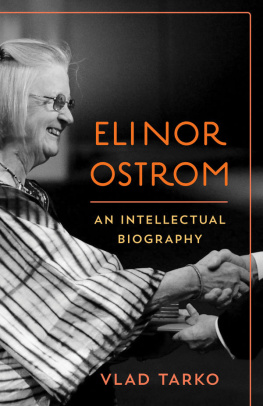

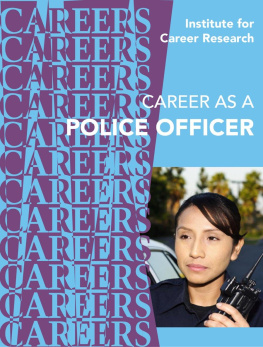
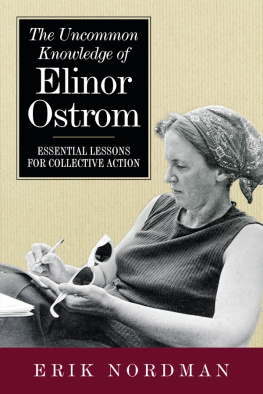
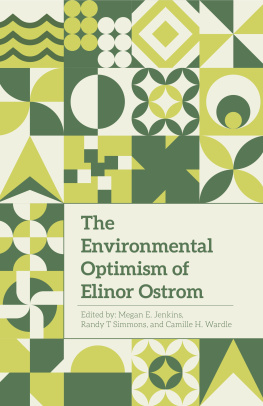
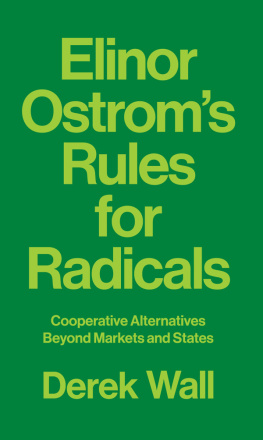
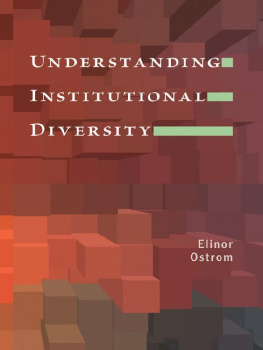
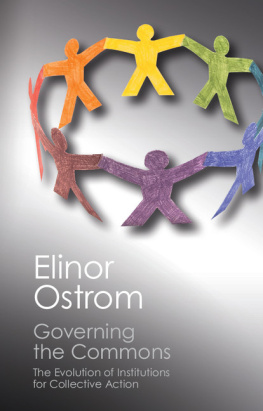

 The paper used in this publication meets the minimum requirements of American National Standard for Information SciencesPermanence of Paper for Printed Library Materials, ANSI/NISO Z39.48-1992.
The paper used in this publication meets the minimum requirements of American National Standard for Information SciencesPermanence of Paper for Printed Library Materials, ANSI/NISO Z39.48-1992.